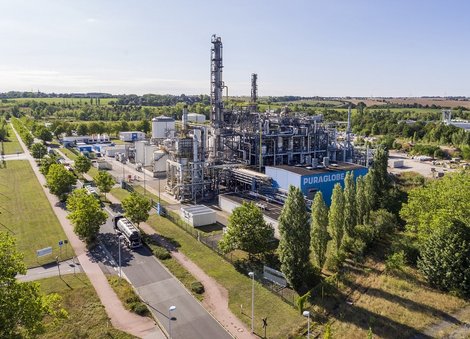Making crystal clear base oil from waste oil
At its site in Saxony-Anhalt, PURAGLOBE produces new lubricants from recycled engine oil in an environmentally sound and climate-friendly process

PURAGLOBE is a group of companies in the field of basic chemicals. In the Chemical and Industry Park Zeitz in the south of Saxony-Anhalt, it uses recycled waste oil from cars and machine tools to make pure base oils in API group III that are then manufactured into new high-quality lubricants. PURAGLOBE is the global pioneer of an innovative future technology that will lead to the development of a worldwide climate-neutral circular economy.
Lubrication is essential to ensure the smooth running of car engines, lathes and many other industrial machines. “Every year around 6.3 million metric tons of lubricants are made from base oils in Europe,” explains Andreas Schüppel, managing director, CEO and president of the PURAGLOBE Group. The majority of the lubricants are currently made from fossil raw materials, such as crude oil. After their use-by date has passed, new lubricants are needed. Much of the contaminated waste oil is unrecoverable, because it is burned in the cement industry, for example.
Given the need to make efficient and sustainable use of fossil raw materials, this is highly wasteful. In addition, high levels of carbon dioxide emissions are produced when manufacturing new base oils and lubricants from crude oil and when burning waste engine oil.
Although the amount of engine oil that is recycled has increased over recent years, the quality of these so-called re-raffinates often leaves a lot to be desired. One exception is the recycled base oils produced by PURAGLOBE in Saxony-Anhalt. These recycled products are as clear and fluid as water. The classification system of the American Petroleum Institute (API) indicates that the base oils produced by PURAGLOBE are of the highest quality. They are fully comparable with base oils manufactured directly from crude oil.
The high level of purity of the recycled base oils has been made possible by the use of a patented high-pressure hydrogenation process developed by Honeywell UOP that is being used for the first time in the refineries at the Chemical and Industry Park Zeitz.
Using synthetic additives, the subsidiary of the American company produces new lubricants from the recycled base oils. These are already approved for use in vehicles in the USA. Andreas Schüppel hopes to gain approval to sell the products in Europe soon.
PURAGLOBE Holding GmbH is the German subsidiary of Puralube Inc., the American parent company that is based in Wayne in the USA. In 2004, Andreas Schüppel, who was born in Saxony-Anhalt and studied process engineering in Merseburg, helped to set up the first PURAGLOBE refinery in the Chemical and Industry Park Zeitz.
Now a network of partner companies from Germany and across the rest of Europe supplies the PURAGLOBE refineries with waste oil from car dealerships and industrial plants. It is delivered in tank wagons by rail and in tankers by road and recycled by PURAGLOBE.
The process of recovering the base oils from the used oil is energy intensive and requires a pure hydrogen atmosphere. However, it offers many competitive advantages in terms of the need to reduce the use of fossil raw materials and to achieve climate neutrality across the globe.
The company from the south of Saxony-Anhalt now produces around 100,000 metric tons of high-quality recycled base oils that can be processed into lubricants and used in cars and machine tools.
Analyses carried out by the Institute for Energy and Environmental Research in Heidelberg show that the re-refining of waste oils with the PURAGLOBE process (the UOP-HyLube™ process) produces around half the carbon dioxide of base oil production from crude oil and other fossil raw materials. Currently that amounts to around 180,000 metric tons of CO2 per year.
“Much more will be possible in the near future,” says Andreas Schüppel, CEO of PURAGLOBE GmbH. His forecast is based on the ongoing expansion of his company in the Chemical and Industry Park Zeitz, where more than a dozen companies are working on future environmentally sound, climate-friendly technologies.
One important area is green hydrogen technology, which will be used to reduce carbon dioxide emissions from burning coal, crude oil and natural gas. It also plays a key role for companies in the Chemical and Industry Park Zeitz. For example, the energy company Getec and the municipal utility company in Zeitz recently decided to build a new wind farm and an electrolysis plant where solar and wind power will be used to produce green, climate-neutral hydrogen from water, which can be used as a chemical fuel.
At the same time, PURAGLOBE intends to put new technologies into industrial use at the site in Saxony-Anhalt that can recover hydrogen from recycled waste oil and marine diesel residues.
These technological innovations will help to protect the earth's climate and to create long-term, secure, well-paid jobs at the site.
Author: Uwe Seidenfaden/IMG Saxony-Anhalt
